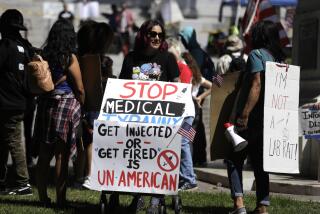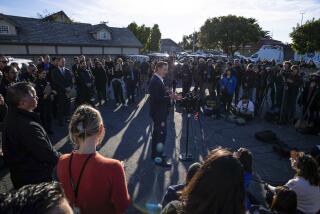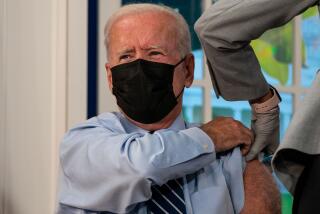Column: He’s been a target of anti-vaxxers. Now he has a warning for the rest of us
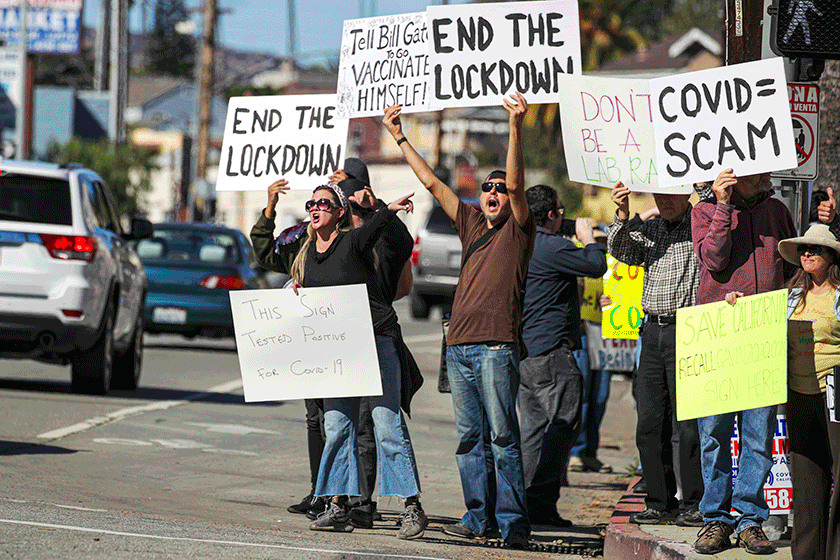
- Share via
If there’s anyone in California who has the right to indulge in a smug smile and an unsolicited “I told you so,” it’s state Sen. Richard Pan.
No one has tangled with “anti-vaxxers,” or opponents of vaccinations, quite the way he has. For his many successful efforts to eliminate immunization exemptions, the Sacramento Democrat has been stalked, shoved and cursed out. He has had his life threatened on social media, had blood thrown at him and faced a recall campaign.
And it’s because of all of this that Pan, who is also a pediatrician, should be heeded now that he’s sounding an alarm about the threat some anti-vaxxers pose to California in the midst of a pandemic.
“These extremists have not yet been held accountable, so they continue to escalate violence against the body public,” said Pan in a recent statement. “We must now summon the political will to demand that domestic terrorists face consequences for their words and actions. Our democracy and our lives depend on it.”
Pan told me this week he was incensed but far from surprised when dozens of vaccine protesters showed up at the COVID-19 vaccination site at Dodger Stadium last weekend, shouting conspiracy theories, waving ridiculous signs and prompting fire officials to briefly shut down operations.
“This just seemed to be another step in the escalation that’s been going on for many years,” he said, calling it part of a “pattern of behavior in the anti-vaccine community.”
In response to the spectacle, he unleashed a torrent of tweets and retweets, assailing those who were making “tyrannical threats” to intimidate people into not getting vaccinated.
Compare that with the initial response from Mayor Eric Garcetti’s office — a tepid promise to review the vaccination site’s safety protocols and establish a designated space for future protests. It was only later, after pressure from the public and members of the City Council, that Los Angeles Police Chief Michel Moore promised that officers would crack down if anti-vaxxers tried to roam through the line of vehicles again.
“Individuals will be arrested, they’ll be cited, and their actions will be caused to be ceased,” Moore said. “This going forward is a means of ensuring that the lines will stay open, that the vaccine sites will be unhindered.”
These very different reactions from public officials raise questions that need to be answered, especially as protesters threaten to shut down more vaccination sites.
How seriously should we be taking the anti-vaccine movement? Is a woman who walks around with a sign that says, “Moderna is not a vaccine. It is gene therapy,” truly dangerous? Or is she just a harmless conspiracy theorist? Where does free speech end and disruption and intimidation begin?
And who are these anti-vaxxers who show up at rallies? Skeptical mothers who have gone down one too many online rabbit holes and now swear by holistic medicine for their kids? Disillusioned supporters of Donald Trump who are bored and crave attention on social media and to be in the thick of things again? Or, as Pan insists, domestic terrorists who disrupt the essential business of government?
As one might imagine, there are lots of differing opinions on this matter. And yet coming to a consensus on an answer and a strategy has never been more critical, given that California is ramping up vaccinations for COVID-19, which is crucial for saving lives.
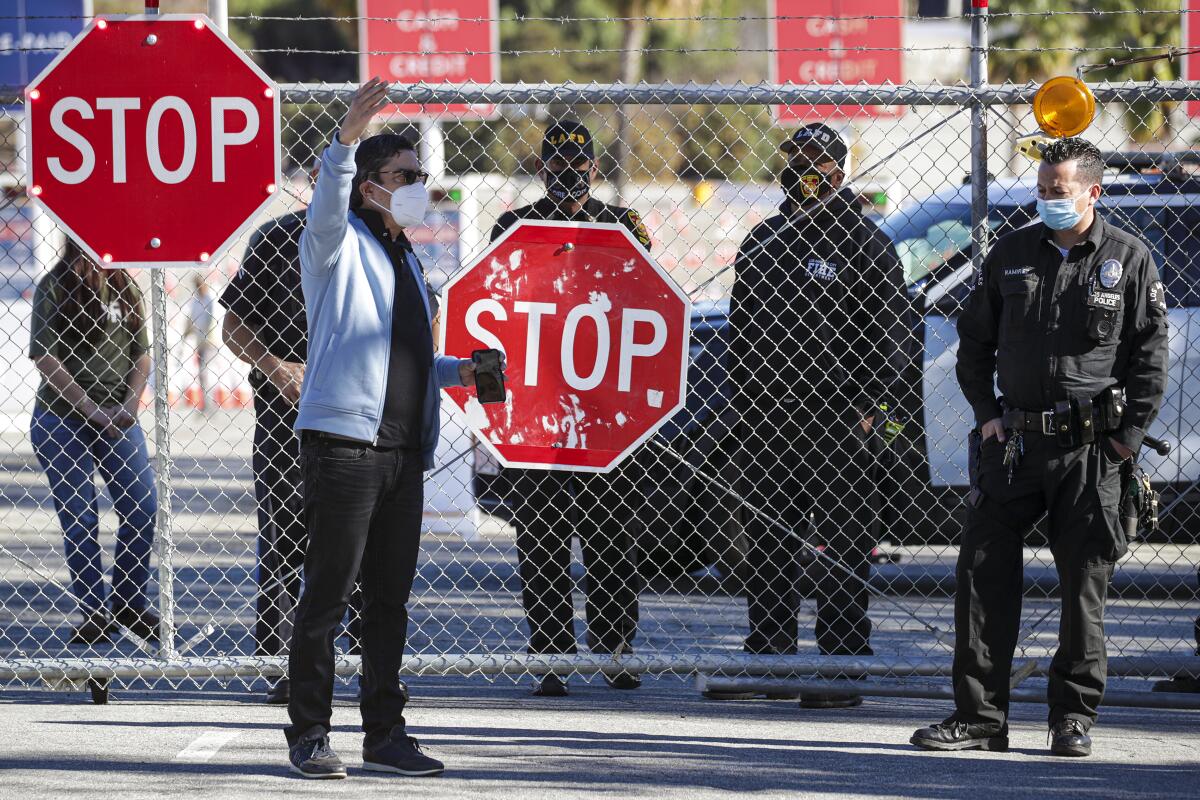
On Wednesday, Gov. Gavin Newsom announced that the Biden administration was launching two new mass vaccination sites — one at Cal State Los Angeles and the other at the Oakland Coliseum. Both will focus on vulnerable communities, including those with limited access to transportation.
“The reason this site was chosen,” Newsom said in Oakland on Wednesday, “was the framework of making sure that communities that are often left behind are not left behind, they’re prioritized in terms of the administration of these vaccines.”
But therein lies part of the problem. That these vaccination sites exist to address the widening racial inequities in the distribution of doses could actually serve as a trigger for some anti-vaxxers.
“They’ve been building alliances with white supremacists, conspiracy theorists and [others] on the far right,” Pan said.
It’s part of the cross-pollination of extremism that accelerated during the pandemic, when rallies against masks and lockdowns drew a noxious mix of Trump supporters, QAnon followers and racist, anti-government militia types. Not to mention people pushing to recall Newsom.
From his vantage point as the author of some of the strictest vaccination laws in the U.S., Pan said he has watched these groups merge with growing alarm even before a far-right mob invaded the U.S. Capitol. He recalled that, in 2019, a group of anti-vaxxers showed up at the state Capitol in Sacramento with self-styled militia members acting as their security. They had holsters on their hips stuffed with copies of the U.S. Constitution instead of guns.
“For the most part, I think that we have not taken seriously these conspiracy-driven movements,” Pan said, adding that because they are largely led by white people, they have often gotten a pass.
A forthcoming bill from state Sens. Henry Stern (D-Canoga Park) and Tom Umberg (D-Santa Ana) would address some of that, by directing state agencies to keep a closer eye on white supremacists and militias — including on social media — in hopes of thwarting acts of domestic terrorism.
Whether that includes members of the anti-vaccine movement remains to be seen. But even before protesters shut down the site at Dodger Stadium, both Stern and Umberg mentioned the threat that some anti-vaxxers have posed in the past. The trick, Stern said, is discerning the difference between people who are organizing acts of violence and those who are expressing general political rage.
Umberg, a former federal prosecutor, put it this way: “You cross the line when you advocate criminal activity to advance your cause. You cross the line when you advocate breaking down the doors of the [U.S.] Capitol. You cross the line when you throw blood on state legislators.”
Pan, unsurprisingly, was more blunt in his assessment. He predicted there will be more disruption at vaccination sites.
“I think we need to be prepared for that,” he said. “Whether it’s groups or individuals trying to disrupt the smaller sites, we need to be sure we’re ready. Law enforcement needs to respond vigorously.”
More to Read
Sign up for Essential California
The most important California stories and recommendations in your inbox every morning.
You may occasionally receive promotional content from the Los Angeles Times.
